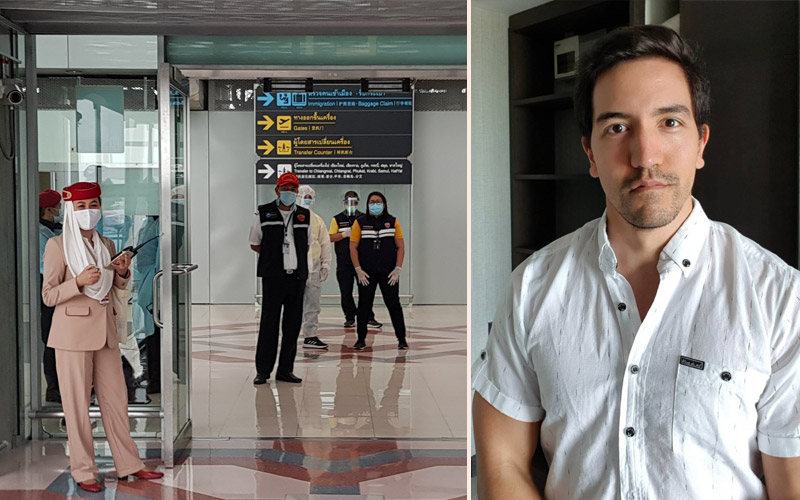The room is spacious and habitable. There’s a television, large fridge, an attached bathroom, a balcony with a view to a desolate field and a table with Personal Protective Equipment.
Also on it are a booklet outlining the hotel’s quarantine rules and a paper with a QR code guests must scan to contact the nurse daily via Line. The phone rings immediately.
“Hello! Welcome to Thailand! Did you have a good flight?” says the operator, who identifies himself as Mac and insists on going through the “Guide Book” together.
Just minutes earlier, a car fitted with a protective screen, driven from a barren Suvarnabhumi Airport terminal by a man wearing what looked just short of a full hazmat suit, pulled up before the deserted hallway of an allegedly packed hotel. It all felt like a mix between Chernobyl, a prison ward and a laboratory experiment.
“Hotel look empty, but you take last room,” Mac said, adding that nobody was allowed outside until they passed their first Polymerase Chain Reaction, or PCR, swab test, seven days into confinement. That will mean a half hour on the patio, with a day’s notice and a mask on while rooms were being cleaned.
Just as other expats became stuck abroad when the country closed its borders in March, this reporter’s Swiss holiday turned into an unexpected six-month stay that just ended last week. After longing to see friends and family over half a year and wondering month after month when a return would be possible, my repatriation ended up requiring great reserves of patience – and money.
Amid the seemingly endless extensions of Thailand’s emergency decree and uncertainty among many a farang stranded outside or inside the kingdom, one thing is clear: Allowing the lucky minority who qualifies to come back is being done efficiently, but not easily.
Few held their breaths when parliament confirmed last week the decree’s extension through November. And as many sit uneasy about their prospects of leaving or returning – while the government keeps haphazardly extending a visa amnesty – the red tape slapped on the process is no more reassuring for those on modest salaries.
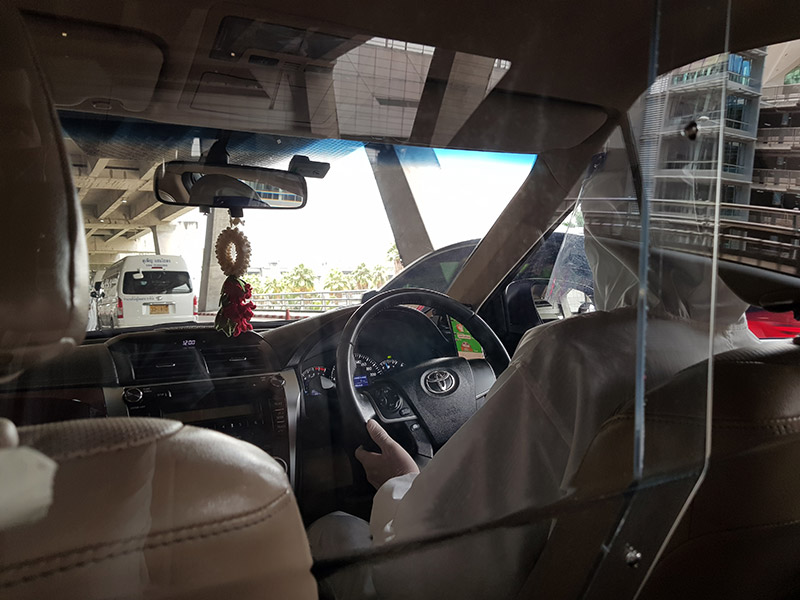
Money is a must
While communication with embassies abroad is generally free-flowing and efficient, requirements to qualify for repatriation can be costly to gather at once.
The hefty price hikes of flights, the cost of insurance and the quarantine facilities alone favor those with larger paychecks, just like providing nine-month visas to a reduced quota of tourists, or mulling a seven-day quarantine to replace the current 14-day one.
It all invariably seems a knee-jerk gimmick to allow a select few in while keeping the decree alive and borders shut, despite almost no local cases being recorded in the country for months.
A one-way ticket into Bangkok from Europe’s major cities such as Paris, London or Frankfurt is no cheaper than THB15,000 on any given day. Return tickets in March, before the border closure, were about THB18,000.
Flights from New York are the cheapest from the United States’ major cities, at about THB25,000.
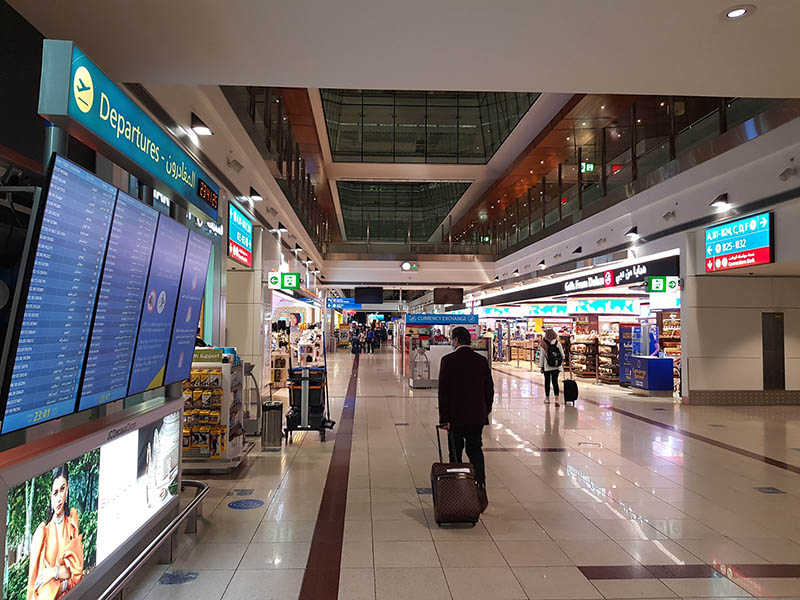
Health insurance – which must specifically state coverage of all COVID-19-related expenses – hovers at about THB30,000. This means returnees have to repurchase insurance if theirs refuses to reissue them a modified certificate.
The cheapest approved government accommodation for a 15-day stay is another THB30,000 baht to THB40,000.
While they all follow an obligatory standardized package model with meals, airport pickup and tests included, the 14 most affordable venues on a list of 16 hotels two weeks ago all said they had no rooms left for the month.
Another had one remaining, but it was windowless. The “last room” this reporter booked at a Samut Prakan hotel, according to Mac, cost THB37,000.
Added to this is the cost of the PCR test that must be taken a maximum of three days before take-off to obtain a “Fit to Fly” certificate. It could be free or a couple hundred euros in Europe, but can set people back more than USD$1,000 (THB32,000) in the United States.
Add it all up, and it’s THB100,000 some may not have for the Certificate of Entry the government issues applicants when all documents are compiled.
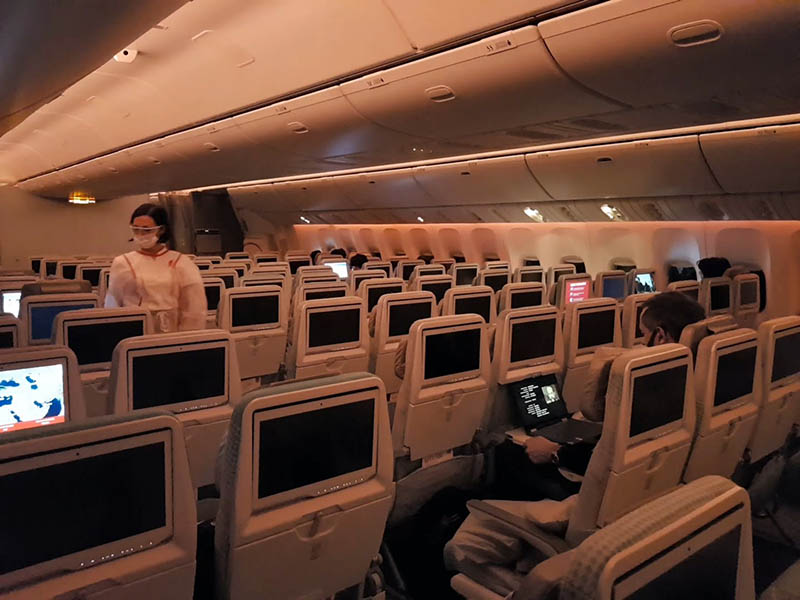
Flying a delight, but eerily sobering
After getting the green light to fly however, the logistics were much more pleasant. Airports aren’t packed, queuing is a thing of the past and flights are on time. It took 15 minutes from the check-in counter to pass security, be waved through immigration and reach the departure gate.
This pleasure was only outweighed by the sobering reminder that the virus has ruined air travel and everything associated with it. Planes fly nearly empty, a loudspeaker call five minutes after boarding time is a “last call,” and the feeling of having the cabin to oneself is, however much delightful, hard to assimilate.
While Thai Airways had long been in trouble and entered restructuring following the pandemic, profitable industry leaders such as Qatar Airways received a USD$2-billion government lifeline last month.
Neighboring Emirates is looking to revive its travel network by serving almost 100 destinations, and is one of the few carriers being allowed into Thailand, but planes made to carry more than 300 passengers struggle to make it past double digits.
“We’re fully staffed but our frequency has suffered,” said a flight manager donning a face shield and full protective gear who was not authorized to speak to the press. “We try to focus as much as possible on hygiene. For example, we have a person exclusively dedicated to cleaning the lavatory.”
The slow frequency was evident: Dubai’s main airport – an international transit hub – looked a shadow of itself last week at peak time, with the only significant queues seen outside smoking lounges as anxious travelers waited to get socially distanced nicotine fixes.
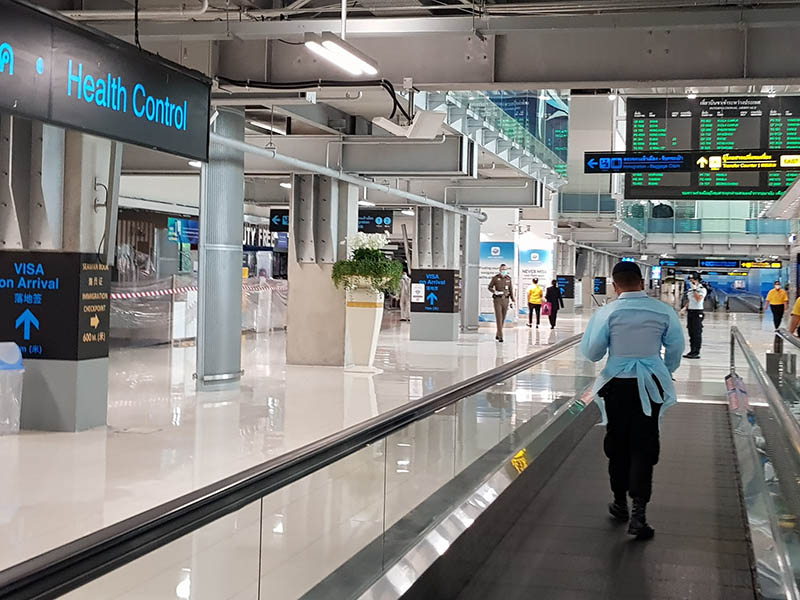
As did Suvarnabhumi Airport’s arrivals section, where at times the ratio of staff outnumbered that of passengers. Long gone are the infamous throngs of people waiting at immigration. Those have been replaced by rows of wide-body planes now parked on the ramp for months, engine covers on and hemorrhaging tens of millions of baht with each passing day.
Scores of chairs lined the sides of a travelator leading to the desk where body temperatures were checked and the THB100,000-worth of travel documents compiled. In a time of digital advancements, it must be noted that everything is required in hard copy.
An officer held a list with the name of every expected passenger. That flight’s was just two pages. Almost half of those were on a layover, bound for Hong Kong on the same plane. Only a couple of the 24 baggage carousels were operational, with luggage being drip-fed in.
Back in the room, with 15 days of confinement ahead, the challenging part for travelers looks to be done. But for Thailand and its upcoming high season, the balancing act to manage its faltering economy, unpopular government and hermetic border is just beginning.
